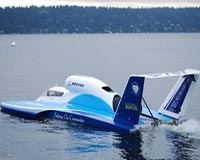 |
Woods Hole MA (SPX) Aug 12, 2009 Plankton Power and the Regional Technology Development of Cape Cod has announced the establishment of a public-private consortium focused on building a leading-edge facility to produce renewable biofuels from algae. Under the leadership of Plankton Power, the RTDC, Massachusetts National Guard, Woods Hole Oceanographic Institution (WHOI), Marine Biological Laboratory (MBL), and Cape Cod Commission are joining forces to establish the Cape Cod Algae Biorefinery. The new facility will focus on pilot- and commercial-scale development of algae biodiesel (a type of biofuel) that is cost-competitive with existing petroleum- and vegetable-based fuels, with improved performance characteristics. The planned biorefinery is proposed for construction on five acres of land on the Massachusetts Military Reservation (MMR) in Bourne, Massachusetts, supported by the Massachusetts National Guard pending legal and regulatory reviews. The pilot facility will provide the required infrastructure for testing commercial scale-up of a breakthrough algae-growth technology resulting from 20 years of cold saltwater species research and production. The biodiesel from Plankton Power algae is a "drop-in" replacement for home heating oil and petroleum diesel and will be produced for commercial distribution. The Cape Cod Algae Biorefinery Consortium recently submitted a $20 million proposal to the U.S. Department of Energy that would leverage $4 million in private funding to construct the proposed facility. MassDevelopment, the Massachusetts Clean Energy Center, and Loud Fuel Company are also supporting the initiative. "Over the next few years, we are ready to set up the MMR as a partner for a number of critical clean-energy initiatives that will not only help the military but boost the regional economy," said U.S. Rep. Bill Delahunt (D-Mass.). "Working with entrepreneurs and the institutions based in Woods Hole, we want to make the MMR not just a center for the National Guard and Coast Guard, but an incubator for cutting-edge initiatives on algae as fuel, wind and solar energy, and unmanned aircraft for joint military and oceanographic research. The use of algae as a fuel has major potential and can be nurtured right on Cape Cod." Beginning in autumn 2010, Plankton Power expects to initiate pilot-scale operations to generate up to one million gallons of biodiesel per year-enough fuel to supply Cape Cod's current biodiesel usage. The company projects that commercial-scale operations on 100 acres could eventually yield 100 million gallons of biodiesel, which would meet 5% of the demand for diesel and home heating fuel in the state of Massachusetts. "We are extremely pleased by the vision and commitment of our consortium partners to achieve the infrastructure, resources, and collaboration necessary to advance commercial development of promising algae-to-biofuel technology on the Cape," said Curtis S. Felix, CEO and Founder of Plankton Power. "The MMR location is ideal for this pilot project--the on-site wastewater treatment plant would provide an excellent source of nutrients for the algae, and MMR's location close to the Cape Cod Canal would provide a convenient source of seawater as well as a renewable thermal energy source for algae growth and temperature control. We acknowledge the National Guard and the state of Massachusetts for providing critical support to this initiative." "The Cape Cod Algae Biorefinery initiative provides a perfect example of the tremendous economic development potential created by fusing the expertise and resources of the Cape's research brain trust to achieve industry goals and government objectives--in this case, the federal mandate to quadruple biofuel use by 2020," said Robert A. Curtis, CEO of RTDC. "By joining forces, this consortium is positioning the Cape and Massachusetts for a leadership role in the development of a critical new, renewable source of energy that will create local jobs in algae farming and downstream industries, advance energy independence, and reduce greenhouse gas emissions." The algae farm facility's location near MBL and WHOI will provide Plankton's team access to the exceptional scientific expertise and resources available at the Cape's two world-leading marine research institutions and facilitate a collaborative approach to address the challenges of efficiently producing commercial quantities of biofuel from algae. "The Cape Cod Algae Biorefinery provides an excellent opportunity to bring WHOI and MBL's combined scientific power to bear on a critical national need," noted WHOI Executive Vice President Larry Madin and Joshua Hamilton, Chief Academic and Scientific Officer of MBL, in a joint statement. "We look forward to applying our institutions' collective expertise and complementary strengths in the ecology and biochemistry of marine algae to support the establishment and production of algae-powered energy on the Cape." Share This Article With Planet Earth
Related Links Plankton Power Bio Fuel Technology and Application News
 Camelina Powers World's First Hydroplane Test Of Sustainable Biofuel
Camelina Powers World's First Hydroplane Test Of Sustainable BiofuelSeattle WA (SPX) Aug 12, 2009 A Boeing U-787 unlimited hydroplane has become the world's first to be powered by 100 percent sustainable biofuel during a demonstration run by legendary hydroplane driver Chip Hanauer at the annual Chevrolet Cup at Seafair. The majority (85%) of the biofuel blend was refined from the energy crop camelina (developed by Seattle s Targeted Growth and grown in eastern Washington and Montana) ... read more |
|
| The content herein, unless otherwise known to be public domain, are Copyright 1995-2009 - SpaceDaily. AFP and UPI Wire Stories are copyright Agence France-Presse and United Press International. ESA Portal Reports are copyright European Space Agency. All NASA sourced material is public domain. Additional copyrights may apply in whole or part to other bona fide parties. Advertising does not imply endorsement,agreement or approval of any opinions, statements or information provided by SpaceDaily on any Web page published or hosted by SpaceDaily. Privacy Statement |